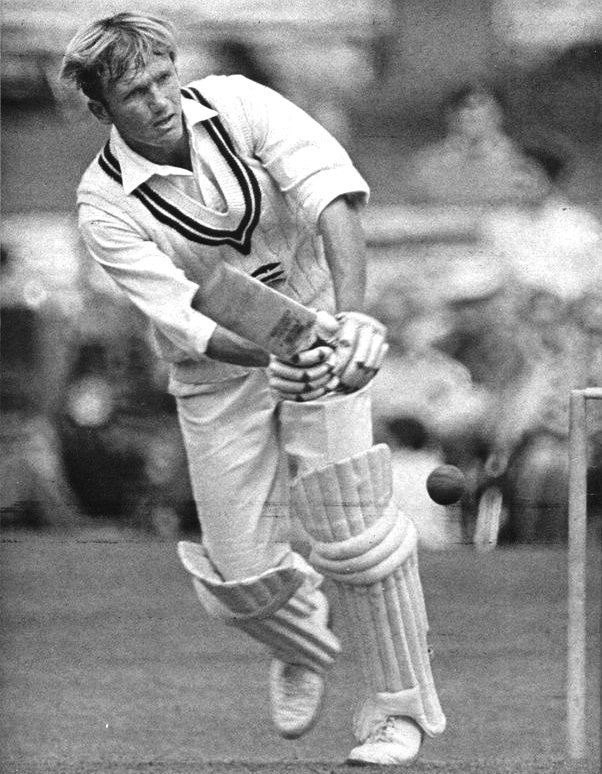Despite Clive Radley’s lack of talent and grace, he made up for it with determination, hard work, and a complete lack of risk-taking. Around the middle of practically every county side is a batsman who scores runs quietly and efficiently, often having to score quickly in the chase for bonus points.
Sometimes he had to rescue a disastrous start, usually playing to his captain’s orders and invariably expecting to produce at least 1,000 runs in the season. Just such a player is Clive Radley, usually batting at No. 5 for Middlesex, a player who, for the past three seasons, has averaged well over 1200 runs and had his best year in 1969 when he batted at No. 4 to aggregate more than 1400 at an average of nearly forty.
Clive Radley was born in Hertford on May 13, 1944, but his family moved to Norfolk, and he went first to King Edward’s Preparatory School, failed his scholarship, and entered King Edward VI Grammar School as a fee-paying pupil. As long as he can remember, he has had a bat in his hands, and at King Edwards, he played through the varying grades until he was included in the first eleven when he was still only fourteen. His father played for Norwich Wanderers, a club side playing at Barton Turf, and Clive Radley and his brother usually set up their stumps when the adults were enjoying a drink after the pine.
Soon the Wanderers captain was watching the enthusiastic kid, who could bat with authority in a rapidly fading light, and at thirteen he was included in the club side. He batted and bowled his legbreaks for the Norfolk Schoolboys, and in the summer that he left King Edwards, he played under Bill Edrich in the Norfolk Minor Counties team.
Bill Edrich was still associated with Middlesex and suggested that they should take the youngster onto their staff, so he came to London and joined Middlesex as a promising batsman and leg spinner. ‘They soon found me out with my bowling,’ he says, ‘for the jump from schoolboy to county second eleven was too much for my gently rolled wrist spinners. A natural ball player, he returned to his Norfolk home in the winter to play soccer for Yarmouth and had trials with the Arsenal resentful side at inside forward.
Strangely, he never regarded himself as a good cricketer in his young days and was surprised when Middlesex offered him a three-year contract and special registration, but perhaps it required the detached and experienced observation of a man like Bill Edrich to see beyond the youth and realize that he had considerable potential. Against Lancashire at Old Trafford in 1964, he made his first county appearance and was indeed grateful for his twenty-one before Ramadhin trapped him into a stumping by Geoff Clayton.
Since then, he has made a logical, almost inevitable, progression, playing his first full season in 1967, when he was given his cap. This was the year when, in the glorious sun of an August Bank Holiday, he took 139 off a laboring Sussex attack, racing through the nineties with a couple of off-side drives for four.
Finally, he was caught trying to drive Ken Soule out of the ground, but those three hours had been a pleasure to watch, and his six and twenty-fours had emphasized that here was a player who reveled in the drive and cut but who could play the onside too and consequently was a difficult man to contain. With Fred Titmus, he still holds the record for the Middlesex sixth wicket when they scored 227 against the South Africans, yet on that occasion, he had arrived at Lord’s not expecting to play.
An injury to Peter Parfitt let him into the side, and Middlesex was in trouble at 72 for 5 when Titmus joined him. His 138 came from the attack of Peter Pollock, Edie Barlow, Dumbrill, and Crookes, while his captain compiled his own century in solid support. After five seasons with the first team, he has consolidated himself in the side, but batting at number five often means chasing hard for bonus points as soon as he gets to the wicket, which is not always conducive to the construction of a sound innings.
There is every possibility that he is correct in believing that he would be a better player batting a little higher when the pressure for quick runs is less and there is the opportunity to take a few ovens judging the pace and bounce of the wicket before building an innings. For the past five winters, he has coached in South Africa for the Transvaal Cricket Union, but it has not always been easy to find a winter occupation, and for several years, he drove the transport for a plant hire contractor.
Its many years since Clive Radley has had a holiday from cricket other than the boat trip to South Africa, and he talks hopefully of several weeks on the snow slopes of Austria or Switzerland somewhere he says, where cricket is unknown and he can relax for a while in an atmosphere completely away from the summer game.
Clive Radley is not an unsociable man; he enjoys a party and shares a London flat with Norman Featherstone and Tim Selwood, yet on a cricket ground. Moreover, he can frequently be found sitting alone, for he is by nature a little reticent, and cricket followers see him as a rather quiet man who assumes real authority only when in the pursuit of runs.
Read More: Peter Such – Classical Off Spinner
